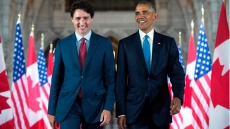TORONTO — It wouldn't be Canada Day without legions of red-and-white Maple Leaf flags being waved with patriotic gusto, fireworks displays lighting up the sky and musical celebrations across the country. But specially branded cigarettes?
This week, Rothmans Benson & Hedges brought out a limited "ehdition" of its Canadian Classics brand in time for Canada Day, a move that has raised the ire of anti-smoking advocates, who argue that such promotion is another reason plain packaging for cigarettes needs to be implemented as soon as possible.
"Here we have a tobacco company using the theme of Canadian pride and Canada Day to sell cigarettes — and that is wrong," said Rob Cunningham, senior policy analyst for the Canadian Cancer Society.
"We should not be using images associated with Canadian pride to market an addictive, lethal product."
The special-edition packaging of Canadian Classics also features a white maple leaf containing the names of the provinces and territories in blue or black, as well as the phrase "Undeniable Canadian Taste" on the obverse side. Even the bar code on the pack has been stylized with a partial maple leaf, continuing the Canadian theme.
Reached Thursday by The Canadian Press, a spokesperson for Rothmans Benson & Hedges said the Markham, Ont.-based company would not provide any comment about the product, how long it will be on the market or the criticism levelled over its packaging.
Cunningham contends the tobacco company is using the product's cardboard wrapper as an advertising vehicle before new regulations mandating plain packaging for cigarettes come into effect.
"What the tobacco companies are doing is they're trying to take advantage of the legislative opportunity while they can," asserted Cunningham.
"In fact, this type of package reinforces exactly why we need plain packaging, because the companies are using the package as advertising and we should not have advertising for this type of product," he said from Ottawa.
"If a smoker takes his or her pack out 20 times a day, every time it's an advertisement and it has the endorsement of the person that's holding the pack, (exposing them to) kids that may see their parents' packs or kids that may see their friends around the schoolyard or in their community."
Among the countries that have adopted plain packaging for tobacco products are Australia, the United Kingdom and France, and research has shown that removing logos, colours and brand images helps make them less appealing to consumers, including young people.
Canada is also moving toward a stripped-down appearance for cigarettes and other tobacco products: on May 31, federal Health Minister Jane Philpott launched public consultations on plain packaging requirements, which will end Aug. 31.
However, the government said it would take up to 24 months for changes to regulations under the Tobacco Act to come into effect.
Cynthia Callard, executive director of Physicians for a Smoke-Free Canada, called the apparent Canada Day marketing measure less than a month after Philpott's announcement "a very provocative action" she likened to trying "to poke a stick in the eye of the government."
She also condemned the use of patriotism as a mechanism for selling a tobacco product: overall, smoking is associated with the deaths of 37,000 Canadians each year from cancer, cardiovascular disease and lung disease.
More than five million Canadians still use tobacco, and Health Canada estimates its use costs the economy almost $4.4 billion in direct health-care costs each year.
"They're linking this brand with this day and a Canadian culture and a kind of attitude," Callard said. "It shows they can use packaging as a way of selling a brand image: you've got attitude if you smoke. You've got attitude if you call it 'ehdition,' eh?
"The McKenzie Brothers are alive and well on the cigarette package."





